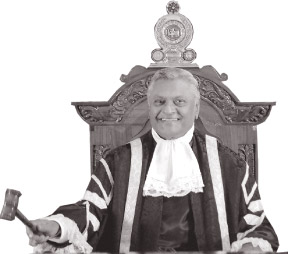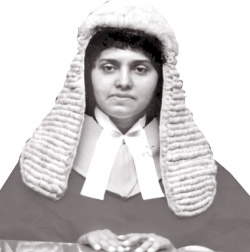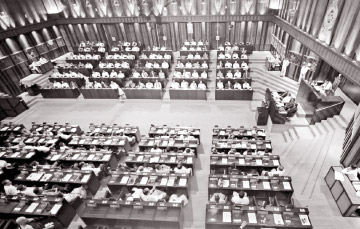Appointment as SC Judge contrary to law
Impeachment – Charge 9:
Koggala Wellala Bandula -Attorney-at-Law
An Impeachment containing 14 charges against Dr Shirani Bandaranayake
the Chief Justice of Sri Lanka signed by many Members of Parliament had
been handed over
|

Speaker Chamal Rajapaksa |
|

Chief Justice Dr Shirani Bandaranayake |
to the Speaker. As there were no sufficient number of
signatures to the Impeachment submitted against President Premadasa, M H
Mohamed without accepting refused the same. Although there were
sufficient number of signatures at the first instance there were Members
who had produced Affidavits and withdrew their signatures. Between this
M H Mohamed left to India. It is true that the son of M H Mohamed was
disappeared after a few days. These are historical facts.
But as the Impeachment received by Speaker Chamal Rajapaksa there
were sufficient number of signatures, it was accepted and appointed a
Parliamentary Select Committee. It is correct and lawful in accordance
with the Constitution.
The allegations framed against Shirani Bandaranayake were published
in the newspapers and her answer too was published in the newspapers.
Newspapers are public documents.
Functions of Supreme Court
Here we shall discuss only about Charge 9.
Whereas, irrespective of the absolute ruling stated by the Supreme
Court in the fundamental rights violation case, President's Counsel
Edward Francis William Silva filed against Shirani Bandaranayake and
three others (1992 New Law Reports of Sri Lanka) challenging the
appointment of the Dr Upatissa Atapattu Bandaranayake Wasala Mudiyanse
Ralahamilage Shirani Anshumala Bandaranayake, when she was appointed as
a Supreme Court Judge, she as acted in contradiction to the said ruling
subsequent to being appointed to the office of the Supreme Court Judge.”
‘Presidents’ Counsel Edward Francis William Silva of No 8, Wijetunga
Avenue, Matara who was practising in the Lawyers Profession for a long
period from the year 1953 filed an action under the provisions of 17 and
126 of the Constitution of Sri Lanka against appointing Shirani
Bandaranayake as a Judge of the Supreme Court. The number of this case
is Fundamental Rights Application SC (App.) F/R 832/96.
The Respondents in this Case were:
1. Dr Shirani Bandaranayake of 19/5, 1st Lane, Rubberwatte Road,
Gangodawila, Nugegoda.
2. Dr G L Peiris, Minister of Justice and Constitutional Affairs, No.
37, Kirula Place, Off Kirula Road, Colombo 5.
3. K Balapatabendi, Secretary of the President, Bullers Road, Colombo
7.
4. The Attorney-General, Attorney General's Department, Colombo 12.
In the aforesaid case filed by Edward Francis William Silva was
decided that violation had been caused in respect of Articles 12 (1) and
14 (1) (a) of the Constitution and following reliefs were granted by the
Supreme Court.
Pray
a) grant leave to proceed in the first instance.
b) declare that the Petitioners’ fundamental rights guaranteed by
Articles 14 (1) (a), 14 (1) (g) and Article 12 (1) have been infringed
and or there is an imminent infringement of same in the event the first
respondent being permitted to discharge the functions of a Judge of the
Supreme Court of the Democratic Socialist Republic of Sri Lanka.
c) declare that the appointment of the First Respondent as a Judge of
the Supreme Court is contrary to law and or the Constitution.
d) grant an interim order that his Lordship the Chief Justice be
pleased not to constitute a Bench comprising the first respondent and or
not calling upon or permitting the First Respondent to carry out the
functions of the Supreme Court will be hearing and determination of this
application
e) call for the file and or resignation documentation of the first
respondent related to her position in the Faculty of Law of the
University of Colombo.
f) make such just and equitable orders and or directions in the
matter of appointment and selection or members of the appellate and or
Supreme Court.
g) grant costs;
h) for such further and other relief as to Your Lordships seem meet.
As stated in the Petition in the said case No. 832/96 the Petitioner
came to know that Dr. Bandaranayake was appointed as a Judge of the
Supreme Court on the 30th day of October 1996.
I am submitting these facts contained in the aforesaid petition for
the purpose of public awareness and not to insult or contempt to any
person and specially without prejudice to the impeachment.
I am saying this at a time when saying that sovereignty meant for the
supremacy of the public.
Paragraph 6 of the petition -
|

Parliamentary proceedings. File photo |
(6) As the time of the said appointment there had been three (3)
vacancies in the Supreme Court. Two vacancies had been created by the
retirement of Justice Kulatunga in April 1996 and the other by the
retirement of Justice Bandaranayake in August 1996. There was also a
vacancy upon Justice Sarath Silva being appointed Attorney-General. One
of these vacancies were filled by the appointment of the then President
of the Court of Appeal Justice Ananda Coomaraswamy as a Judge of the
Supreme Court by the President.
Integrity of judiciary
(7) The convention/practice of appointing Judges to the Supreme Court
has been by selection of suitable persons from members of the judiciary
also members from the official and unofficial bar upon recommendation
and consultation with His Lordship the Chief Justice. This is to ensure
the independence, impartiality and integrity of the judiciary.
It is concomitant to the high place accorded to an independent
judiciary that only persons of undoubted ability and experience be
appointed as judges of the Supreme Court. The Chief Justice is best
equipped to know and assess the worth of a candidate and his/her
suitability for appointment. This process eliminates political influence
at the time of Appointment.
(8) The Petitioner states that the two vacancies in the Supreme Court
were pending at a time when Justice Dr Asoka de Z Gunawardena was the
President of the Court of Appeal (which position he still holds) and
convention good and reasonable administration demanded that he be
appointed to the Supreme Court when the President deems it fit to fill a
vacancy existing in the Supreme Court unless the President deems it fit
to appoint another of not less than or of a superior qualification and
equal eminence to the Supreme Court from either the official or the
unofficial bar.
(9) The Petitioner states that Justice Dr Asoka de Z Gunawardena has
been engaged in at least 27 years of active practice and possesses at
least six years judicial, experience and holds the degree of Doctor of
Philosophy in Laws the University of Monash, Australia.
(10) In accordance with practice His Lordship the Chief Justice had
recommended the appointment of Dr Asoka Gunawardena to the Supreme Court
when the vacancies arose in the Supreme Court in the manner pleaded
above.
The Second most senior Judge eligible for appointment is Justice D P
S Gunasekera who counts at least 24 years in active practice and at
lease five years as a Judge. The Petitioner is aware that without due
regard to the said two judges and or their qualifications the first
respondent has been appointed.
(11) The Petitioner states that the appointment of the first
Respondent was without reference to the Chief Justice and in disregard
of and/or contrary to his recommendation and contrary to convention and
the Constitutional safeguards related to the independence and
impartiality of the Judiciary. The First respondent was neither
recommended by the Chief Justice nor was the Chief Justice consulted
prior to this appointment as has been the established procedure by
convention. The Petitioner verily believes that the First Respondent's
appointment was contrived by the Second and Third Respondents and more
particularly by the Second Respondent who usurped the rightful authority
of the Chief Justice to have a voice in an appointment to this Court.
Fundamental rights of petitioner
(12) The Petitioner also states that the appointment of the First
Respondent in preference to the appointment of Asoka de Z Gunewardena
was arbitrary, contrary to convention/practise is in breach of the
Fundamental rights of the Petitioner to practice their profession before
an independent and impartial judiciary, especially as Asoka de Z
Gunewardena presided over a bench of the Court of Appeal in two cases
wherein the power of the Governor to dissolve the North Central and
Sabaragamuwa Provincial Councils were successfully challenged.
(13) This decision upheld by the Supreme Court set aside and ruled
against executive discretion to dissolve Provincial Councils which the
Petitioner reasonably apprehend has resulted in judges who have given
decisions 'unfavourable' to the government being victimized/treated
unfairly.
(14) Petitioner states that the professional and academic
qualifications of the First Respondent are as follows:
i. Bachelor of Laws from the University of Colombo (2nd Class Upper)
ii. Enrolled as an Attorney-at-law of the Supreme Court of the
Democratic Socialist Republic of Sri Lanka on or about 1983.
iii. Doctor of Philosophy from the University of London, in the field
of Local Government Law.
(15) The Petitioner also states that the First Respondent who has
been continuously teaching also held the posts of Head of Department and
the Dean of the Faculty of Law of the University of Colombo for a few
years which are merely academic positions requiring no professional
excellence.
(16) Petitioner states that,
i. though enrolled as an Attorney-at-law of the Supreme Court the
First Respondent has not on any single occasion engaged in the practice
of the law in the original courts and or tribunals and or appellate
courts.
ii. On paper the First Respondent has been a lawyer for 13 years.
iii. Though being a teacher and an academic the first Respondent has
not published any books on any subject of the Law.
(17) Petitioner further states that as at date the minimum
qualifications for appointment to the level of a District judge is 15
years active practice as is seen by Circular marked P1 and pleaded as
part and parcel hereof. Promotion to superior and or appellate courts
being from the career judges in the absence of specially qualified
persons from the unofficial or official bar the appointment of the First
Respondent with less than minimum qualification for a District Court
Judge even in contrary to law. |







